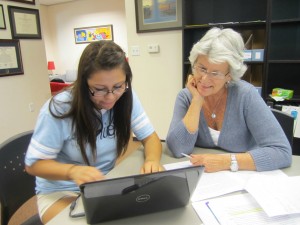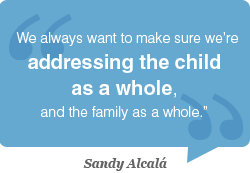No matter how ambitious and responsible a child is, sometimes the smallest obstacle can block a lifetime of opportunity. For students who are balancing academic achievement with social, familial, economic or health issues, something’s bound to slip. That’s when a support network is so important — mentors who can redirect overwhelmed students, remove obstacles and open young eyes to opportunities they didn’t see before.
For the nearly 60 percent of Texas’ student population considered economically disadvantaged, the difficulties faced outside the classroom have an immense bearing on their ability to succeed within it. Those challenges are compounded when students come from families that do not have first-hand experience or familiarity with securing success in the educational system.
No matter how much they aspire for their children to find academic success, these parents are often less knowledgeable about the steps necessary to succeed in high school and get into college. They often lack the time and money to help their children scale the academic ladder.
The community bears the scars of parents’ and children’s blocked dreams. Each class of dropouts in Central Texas costs $425 million in lost income. Dropouts bring in less tax revenue, cost more in public safety because of higher arrest rates and are more likely to use public assistance programs.
School structures are not able to make up for this gap in parental knowledge. Schools lack the resources to guide the parents along and remove the obstacles that sideline the most ambitious of students. Most high schools no longer have a homeroom, so no specific teacher is assigned to track an individual student’s progress and help with basic but important tasks such as class selection.
Two Central Texas nonprofits have stepped up to help create support networks around students and families looking to climb to new educational heights. Breakthrough Austin and Con Mi MADRE have created two programs that are guiding Central Texas students through personal and academic challenges, teaching them to dream big and secure those dreams.
Breakthrough Austin helps ignite motivation
Breakthrough Austin doesn’t just help kids achieve academic success. The group works to ensure that those kids know why success matters and the kind of lives it can lead to.
 “Breakthrough prepares students for college in order to increase their career options, earning potential, and quality of life,” says Executive Director Barry Aidman.
“Breakthrough prepares students for college in order to increase their career options, earning potential, and quality of life,” says Executive Director Barry Aidman.
Middle school students from low-income families are more than twice as likely as other students to expect their education to end before college. They can’t lean on the experience of their parents in navigating the process of getting into and finishing college. These students receive less education outside the classroom and feel the learning loss of the summer months more keenly.
 “The highest performing low-income eighth-graders go to college at the same rates as the lowest performing of the most affluent teenagers,” Aidman says.
“The highest performing low-income eighth-graders go to college at the same rates as the lowest performing of the most affluent teenagers,” Aidman says.
Breakthrough helps level the divide for low-income students with summer programs, after-school programming and personalized support and advocacy throughout their education. The group shows students why education matters through meetings with adults who enjoy their work in different professional fields.
For its summer programs, Breakthrough brings in college students from a variety of disciplines and backgrounds to teach students.
"These kids are used to traditional instruction, and during the summer they're taught by these young students who look like them and use a project-based curriculum to help them be more hands-on,” Aidman says.
 The approach pays off. The voluntary summer classes receive over 90 percent attendance by participating students, all of whom show academic improvement on tests taken at the end of the summer. By matching students with mentors closer to their own age, Breakthrough gives them role models and often a more fun approach to learning than what they’re used to during the school year.
The approach pays off. The voluntary summer classes receive over 90 percent attendance by participating students, all of whom show academic improvement on tests taken at the end of the summer. By matching students with mentors closer to their own age, Breakthrough gives them role models and often a more fun approach to learning than what they’re used to during the school year.
Breakthrough also provides activities that emphasize communication, leadership and self-advocacy — skills that help students learn how to be good members of society.
“The key is, how do you teach people to learn what they need to know in order to be successful and then apply that learning to practical situations where it’s going to help them be good citizens and have a good career,” Aidman says.
Get Involved with Breakthrough Austin
Con Mi MADRE makes learning a family goal
The women of Con Mi MADRE emphasize the importance of a holistic approach in helping Hispanic girls finish high school and college. Con Mi MADRE was founded after the Junior League of Austin learned in the early 1990s that Hispanic girls had one of the lowest rates of college attendance of any group. That fact, coupled with the rapid growth of the Hispanic population in Texas, put the state at risk of having a large segment of poorly educated residents.
“The Hispanic female, s he has the highest rate of teen pregnancy, the highest rate of domestic violence, the highest rate of depression,” says Executive Director Sandy Alcalá.
he has the highest rate of teen pregnancy, the highest rate of domestic violence, the highest rate of depression,” says Executive Director Sandy Alcalá.
Those problems can distract from school performance and lead to dropping out. For many girls and their families, the problems are compounded by the challenge of learning English while navigating the school system and college application process.
 As the name — “with my mother” in English — implies, Con Mi MADRE engages the mothers of the students. The nonprofit encourages a strong relationship between mother and daughter, involving the mothers at every opportunity in the programming and activities. Through mother and daughter conferences, leadership training, college prep assistance and a healthy living program, the students and their mothers work toward academic success and a better life for the whole family.
As the name — “with my mother” in English — implies, Con Mi MADRE engages the mothers of the students. The nonprofit encourages a strong relationship between mother and daughter, involving the mothers at every opportunity in the programming and activities. Through mother and daughter conferences, leadership training, college prep assistance and a healthy living program, the students and their mothers work toward academic success and a better life for the whole family.
“We always want to make sure we’re addressing the child as a whole, and the family as a whole,” Alcalá says.
Many of the girls’ families come from cultures where a middle school education has been acceptable for women, so for the girls to make progress, the family must understand the importance of education.
 Con Mi MADRE provides mentors to help girls navigate the educational system in high school, during the college application process, when seeking out financial aid and scholarships, and throughout their time in college. Alcalá says that the organization’s most important work may be the help it gives to girls in dealing with personal problems.
Con Mi MADRE provides mentors to help girls navigate the educational system in high school, during the college application process, when seeking out financial aid and scholarships, and throughout their time in college. Alcalá says that the organization’s most important work may be the help it gives to girls in dealing with personal problems.
“It’s not just being prepared academically,” Alcalá says. “It’s learning how to deal with the other issues that come at you in life.”
Encouraging Hispanic families to place a greater priority on higher education can go a long way toward increasing the portion of the Texas population that’s educated, helping future generations out of poverty and making the state more competitive economically.
“What we’re striving for, ultimately, is to have an educated, bi-lingual workforce,” Alcalá says.






